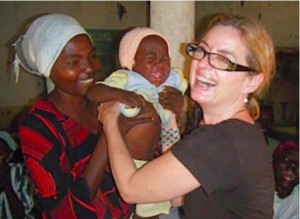. . WOMEN’S EQUALITY . .
An article by Ann Grauvogl, University of Wisconsin – Madison News
The University of Wisconsin—Madison has been awarded a UNESCO Chair on Gender, Well-being and a Culture of Peace, a first in the state of Wisconsin and a first for the university in any area. It creates a global platform for the Department of Gender and Women’s Studies and for the campuswide 4W (Women and Well-being in Wisconsin and the World) Initiative.

Araceli Alonso in Kenya, 2009. PHOTO COURTESY OF COLLEGE OF LETTERS & SCIENCE
“This recognition by the United Nations Educational, Scientific and Cultural Organization (UNESCO) affirms UW–Madison’s strength in addressing global issues,” says Chancellor Rebecca Blank. “The interdisciplinary ethic of our faculty, staff and students allows us to engage on complex issues from a host of perspectives. That’s a valuable asset to the UNESCO network around the world.”
UNESCO has designated more than 670 chairs worldwide to promote international cooperation and networking among universities. UW–Madison joins a network of 12 other chairs on gender around the world, connecting efforts of women in Europe, Latin America, Africa and the United States.
“The establishment of this chair is a testimony to the role that UW–Madison has played, locally and globally, to advance women in a broad array of fields, including human ecology, gender and women’s studies, nursing and education,” says Lori DiPrete Brown, director of the 4W Initiative and an associate director of the Global Health Institute (GHI). “The robust range of activities of 4W leaders from throughout campus was an important factor in determining the award.”
The Chair Selection Committee recognized UW–Madison’s plans to encourage innovation through technological databases, online portals, North-South collaboration and information sharing.
“The chair will be the first in North America to interrelate gender, well-being and culture of peace through researchers, practitioners and advocates for knowledge exchange and collaboration,” according to a statement from the committee.
(Article continued in right column)
Does the UN advance equality for women?
(Article continued from left column)
The chair will be housed in the Department of Gender and Women’s Studies and is created in partnership with the Foundation for a Culture of Peace in Madrid, Spain. The activities of the chair will be integrated with the 4W Initiative and will include an annual summit, a broad range of field activities, and publications related to gender, well-being and a culture of peace.
Araceli Alonso, a senior lecturer in gender and women’s studies and 4W director for Gender, Clinical Practice and the Health Sciences, and Teresa Langle de Paz, co-director of Women’s Knowledge International at the Foundation for a Culture of Peace, will jointly hold the chair.
Alonso also founded the Health by Motorbike Project in Kenya and co-leads 4W’s project to end sex trafficking and exploitation. She has collaborated with other UNESCO chairs on gender and development and welcomes the chance for further collaboration locally, regionally, nationally and globally.
Langle de Paz is also an honorary fellow for the Women’s Research Center at the Gender and Women’s Studies Department.
“The UNESCO chair can take our work at UW–Madison a step further into a global arena fostering transnational cooperation between feminist scholars, gender issues professionals, institutions, networks, policy makers and organizations,” Alonso says. “We expect to create a global learning community and a platform of leaders committed to gender equality and equity, human flourishing and well-being, and a culture of peace that respects all human rights and promotes sustainable development, thinking not only on present generations but also in future ones.”
Karl Scholz, dean of the College of Letters & Science, is thrilled to house the chair in Gender and Women’s Studies.
“This will enhance our efforts to improve the health, education and well-being of women all over the world,” Scholz says. “With this recognition, we will be able to engage more students and scholars from across campus, which truly epitomizes the Wisconsin Idea.”
The designation gives UW–Madison a voice on these issues at an international level, says Soyeon Shim, dean of the School of Human Ecology (SoHE) and 4W lead dean.
“The UNESCO Chair gives the university the credibility and prestige on gender, well-being and a culture of peace, a topic that’s also important to the United Nations,” Shim says.
The chair provides both the opportunity and responsibility for UW–Madison faculty, staff and students to continue their work on issues of gender and well-being. Through research, service, leadership and collaboration with partners from around the world, they are improving access to health care in Kenya and Ethiopia, empowering women farmers in Ghana, collaborating with artisans in Mexico and Ecuador, and working to stop sex trafficking both locally and globally.
“We’re not just dreaming this thing, we’re doing it already,” Shim says.